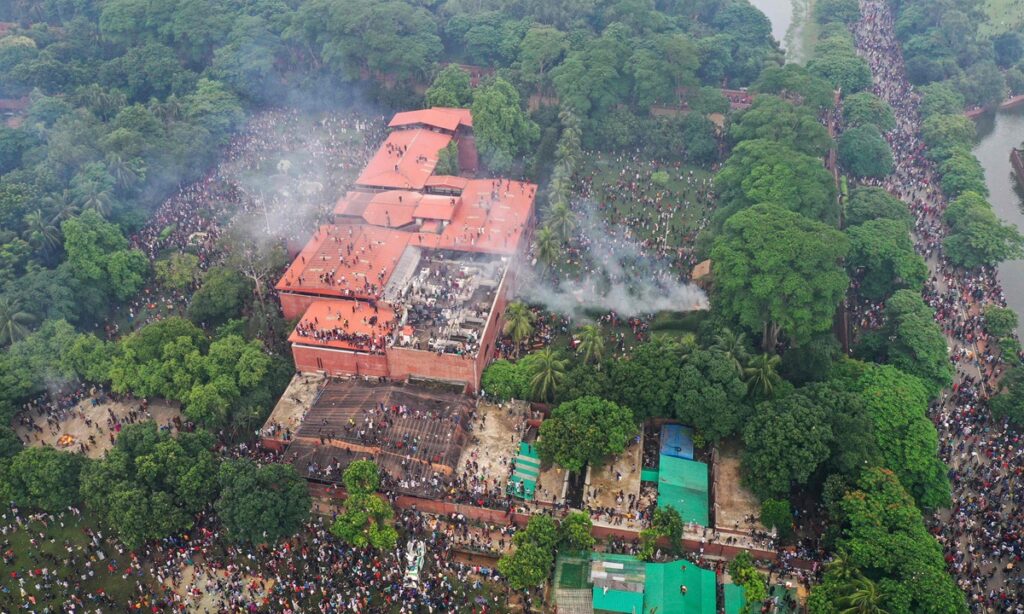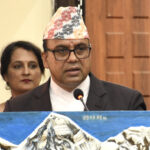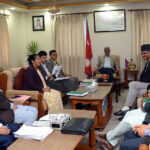KOLKATA, Aug 8, 2024 :
Hundreds of Hindus in Bangladesh were gathered along the Indian border hoping to cross, security officials said Thursday, days after a student-led uprising toppled prime minister Sheikh Hasina.
Some businesses and homes owned by Hindus were attacked following Hasina’s ousting, and the group is seen by some in Muslim-majority Bangladesh as having been close to her.
“Several hundred Bangladeshi nationals, mostly Hindus, gathered at different points along India’s border with Bangladesh,” Amit Kumar Tyagi, India’s Border Security Force (BSF) deputy inspector general, told AFP.
More than 200 people were “standing close” to the frontier with India’s border in West Bengal state.
In the state’s Jalpaiguri district, more than 600 Bangladeshis gathered in no-man’s land, Tyagi added.
“As there is no fence here, BSF personnel formed a human shield to keep them at bay,” he said.
Officers fired a blank shot into the air to disperse crowds, he added.
Hasina, 76, who had been in power since 2009, quit on Monday after more than a month of deadly protests.
The security situation in Bangladesh has since dramatically improved but there have been reports of revenge attacks on her supporters and party officials.
The Bangladesh Hindu Buddhist Christian Unity Council said earlier this week that at least 10 Hindu temples were attacked by “miscreants” on Monday.
A hospital official, on condition of anonymity, told AFP that one man from the community was beaten to death in the country’s southern Bagerhat district.
In India, where Hasina is now taking shelter, foreign minister S. Jaishankar said Tuesday his government was “monitoring the situation” with regard to minorities.
(AFP)
How Bangladesh student protests brought in a new leader
DHAKA, Aug 8, 2024:
A student-led uprising in Bangladesh against government hiring rules culminated this week in the prime minister fleeing, with Nobel peace prize winner Muhammad Yunus set to lead a caretaker government.
At least 450 people were killed in more than a month of deadly protests that ended the autocratic rule of 76-year-old prime minister Sheikh Hasina.
Here are five key dates explaining how the protests toppled the government in the South Asian nation of about 170 million people.
– July 1: Blockades begin –
University students build barricades blocking roads and railway lines to demand reforms to a quota system for sought-after public sector jobs.
They say the scheme is used to stack the civil service with loyalists of Hasina’s ruling Awami League.
Hasina, who won a fifth term as prime minister in January after a vote without genuine opposition, says the students are “wasting their time”.
– July 16: Violence intensifies –
Six people are killed in clashes, the first recorded deaths in the protests, a day after bitter violence when protesters and pro-government supporters fought in Dhaka with sticks and hurled bricks at each other.
Hasina’s government orders the nationwide closure of schools and universities.
– July 18: Hasina rebuffed –
Students reject an olive branch from Hasina, a day after she appeals for calm and vows that every “murder” in the protests would be punished.
Protesters chant “down with the dictator” and torch the headquarters of state broadcaster Bangladesh Television and dozens of other government buildings.
Clashes escalate despite a round-the-clock curfew, the deployment of soldiers and an internet blackout.
Days later, the Supreme Court rules the decision to reintroduce job quotas was illegal.
But its verdict falls short of protesters’ demands to entirely abolish reserved jobs for children of “freedom fighters” from Bangladesh’s 1971 independence war against Pakistan.
– August 5: Hasina toppled –
Hasina flees Dhaka by helicopter as thousands of protesters storm her palace, with millions on the streets celebrating, some dancing on the roof of armoured cars and tanks.
Bangladesh army chief General Waker-Uz-Zaman announces in a broadcast on state television that Hasina had resigned and the military would form an interim government.
– August 8: Yunus to lead –
Nobel peace prize winner Yunus, 84, flies to Dhaka to lead a caretaker government.
He is expected to be sworn in later in the day, to begin what the army chief has vowed will be a “beautiful democratic process”.
(AFP)
Members of interim govt led by Nobel laureate Muhammad Yunus to take oath today
Dhaka [Bangladesh], August 8 :
Members of the interim government led by Nobel laureate Muhammad Yunus will take the oath tonight. Bangladesh Army chief General Waker-Uz-Zaman said on Wednesday that the oath-taking ceremony is likely to be held at 8:00 pm (local time) in the presence of some 400 dignitaries, Daily Star reported.
The oath-taking ceremony will be held three days after the cabinet was dissolved following the resignation of Bangladesh Prime Minister Sheikh Hasina.
Waker-Uz-Zaman indicated that the interim government might comprise 15 members. However, he did not mention their names and possible tenure of the government. He spoke to reporters at the Army Headquarters on Wednesday.
General Waker-Uz-Zaman expressed hope that normalcy would return within three to four days as the situation in Bangladesh is improving significantly. He said that those involved in the crimes committed over the past few days will not be spared and legal action will be taken against them.
Earlier on Tuesday, Bangladesh President Mohammed Shahabuddin agreed to the proposal of the key student protest organizers to make Yunus the head of Bangladesh’s interim government. Since then, the people of Bangladesh have wanted to know when the government would take charge and bring the situation across the country under its control.
On Tuesday, General Waker-Uz-Zaman said he had spoken to Muhammad Yunus and felt “very good talking to him, Daily Star reported.
He said, “I felt very good talking to him. It seemed to me that he was very eager to take up the responsibility. I’m certain that he will be successful in taking us to a democratic process, and that we will benefit from it.”
General Waker-Uz-Zaman said they have spoken with political parties and protest organizers about making Yunus the interim government chief. He said they spoke to the Bangladesh President and made the proposal.
He expressed hope that Yunus would receive support from all political parties and students, and would be successful in performing his duties. He said, “The navy chief, the air force chief and I … We all will support him.”
Bangladesh army chief appreciated the students and volunteers who were working to maintain traffic on the city streets in the absence of traffic police and clean vandalized places. He requested them to continue the good work.
He said students, after his request, worked to stop looting and other criminal activities committed outside Dhaka. The Bangladesh army chief said he had spoken to commanders and general officers commanding (GOC) and came to know that the situation was improving significantly.
General Waker-Uz-Zaman called on the people not to believe any rumours involving the army. He said work is being done to revamp the police force as a new inspector general of police has already been appointed and expressed hope that police personnel would begin performing their duties soon.
He said, “I want to assure that the army, navy, and air force were with the people and will be with them.”
When asked about people’s concerns regarding the recent incidents of looting and vandalism, General Waker-Uz-Zaman said he has taken responsibility for all people and requested cooperation from political leaders in this regard as there were possibilities of such incidents during the transition of power.
He said, “They [political leaders] assured me of their best possible cooperation. Even though some incidents took place there are some reasons behind it. The situation, however, is getting normal.”
General Waker-Uz-Zaman said police personnel were not on the ground and it was not possible to fill the void with the army personnel. He said that the army personnel were trying their best and they rescued thousands of people, and police personnel and were guarding places like the airport.
He said, “I’m very sorry and embarrassed for what has taken place in the first one or two days.” He stated navy and air force personnel were also working.
Bangladesh army chief said, “We have tried our best. But still, some incidents happened. It is simply because we did not have enough strength. But I’m sure when the police force gets revamped, the void will easily be filled.”
“But I want to say that we will try our best to bring those involved in such [criminal] activities to book,” he added.
When asked if he had any plan to increase the number of force on the ground, he responded, “All the personnel we have in the military have already been deployed and they are working,” Daily Star reported.
In response to another question, he stated, “Politicians asked me to take the responsibility [of people’s safety].” He stated, “Somebody has to take it [responsibility]. There was no one to take it and thus I shouldered the responsibility. I have to take the responsibility if there is any failure here. I have tried my best and normalcy will return within a very short time.”
He added, “But we have a lot to do. Give me some more time.”
Meanwhile, Muhammad Yunus has called violence an “enemy” and stressed that people must protect and make Bangladesh a wonderful country for them and future generations, Daily Tribune reported.
In a statement, he stated, “Our youth is ready to give this leadership in creating a new world. Let us not miss the chance by going into any senseless violence. Violence is our enemy. Please don’t create more enemies. Be calm and get ready to build the country.”
Yunus congratulated the students who took the lead in making their “Second Victory Day” possible, Daily Tribune reported. He said, “Let us make the best use of our new victory. Let us not let this slip away because of our mistakes.”
He urged people to stay calm and asked them to “refrain from all kinds of violence.” He called on all students, members of all political parties, and non-political people to stay calm.
He said, “This is our beautiful country with lots of exciting possibilities. We must protect and make it a wonderful country for us and our future generations.”
“If we take the path of violence everything will be destroyed. Please stay calm. Help those around you to stay calm,” he added, according to a Daily Tribune report.
Bangladesh is facing a fluid political situation with Sheikh Hasina tendering her resignation from her post in the wake of mounting protests on August 5. A day after Sheikh Hasina resigned as Bangladesh PM and left the country, Mohammed Shahabuddin announced the dissolution of the country’s parliament to make way for the formation of an interim administration.
(ANI)




